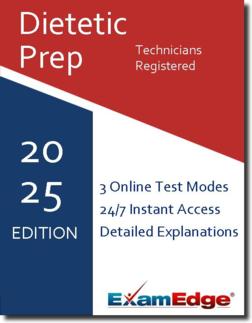Dietetic Technicians Registered (DTR) Practice Tests & Test Prep by Exam Edge - FAQ
Based on 34 Reviews
- Real Exam Simulation: Timed questions and matching content build comfort for your Dietetic Technicians Registered test day.
- Instant, 24/7 Access: Web-based Dietetic Technicians Registered practice exams with no software needed.
- Clear Explanations: Step-by-step answers and explanations for your Dietetic exam to strengthen understanding.
- Boosted Confidence: Reduces anxiety and improves test-taking skills to ace your Dietetic Technicians Registered (DTR).

Why should I use Exam Edge to prepare for the Dietetic Technicians Registered Exam?
FAQ's for Exam Edge Dietetic Technicians Registered practice tests
- Comprehensive content: Exam Edge's Dietetic Technicians Registered practice tests are created specifically to prepare you for the real exam. All our Dietetic Technicians Registered practice test questions parallel the topics covered on the real test. The topics themselves are covered in the same proportions as the real test too, based on outlines provided by the Canadian Dietitian Registration in their Dietetic Technicians Registered test guidelines.
- Realistic practice: Our Dietetic Technicians Registered practice exams are designed to help familiarize you with the real test. With the same time limits as the real exam, Our CDR practice tests enable you to practice your pacing and time management ahead of test day.
- Detailed explanations: As you complete your practice tests, we show you which questions you answered correctly and which ones you answered incorrectly, in addition to providing you with detailed step-by-step explanations for every single Dietetic Technicians Registered practice exam question.
- Performance insights: After you complete a practice test, we provide you with your raw score (how many you answered correctly) and our estimate of the Dietetic Technicians Registered score you would have received if you had taken the real test.
- Ease of access: Because all Our CDR practice tests are web-based, there is no software to install. You can take Dietetic Technicians Registered practice exams on any device with access to the internet, at any time.
- Flexible use: If you must pause while taking one of Our CDR practice exam, you can continue right where you left off. When you continue the test, you will start exactly where you were, and with the same amount of time you had remaining.
- Thousands of unique questions: We offer 20 different online practice exams with 2,200 unique questions to help you prepare for your Dietetic Technicians Registered !
- Low cost: The cost of ordering 5 practice tests is less than the cost of taking the real Dietetic Technicians Registered test. In other words, it would be less expensive to order 5 practice tests than to retake the real Dietetic Technicians Registered exam!
- Our trusted reputation: As a fully accredited member of the Better Business Bureau, we uphold the highest level of business standards. You can rest assured that we maintain all of the BBB Standards for Trust.
- Additional support: If you need additional help, we offer specialized tutoring. Our tutors are trained to help prepare you for success on the Dietetic Technicians Registered exam.
What score do I need to pass the Dietetic Technicians Registered Exam?
To pass the Dietetic Technicians Registered test you need a score of 25.
The range of possible scores is 1 to 50.
How do I know the practice tests are reflective of the actual Dietetic Technicians Registered ?
At Exam Edge, we are proud to invest time and effort to make sure that Our CDR practice tests are as realistic as possible. Our practice tests help you prepare by replicating key qualities of the real test, including:
- The topics covered
- The level of difficulty
- The maximum time-limit
- The look and feel of navigating the exam
Do you offer practice tests for other Canadian Dietitian Registration subjects?
Yes! We offer practice tests for 2 different exam subjects, and there are 40 unique exams utilizing 4200 practice exam questions. Every subject has a free sample practice test you can try too!
Dietetic Technicians Registered (DTR)
Practice Tests
Registered Dietitian (RD)
Practice Tests
To order tests, or take a sample test, for a different subject:
Click on ' Name on the Exam Name' You will be take to the orders page
How do I register for the real Canadian Dietitian Registration ?
For up-to-date information about registration for the Canadian Dietitian Registration , refer to the Canadian Dietitian Registration website.


